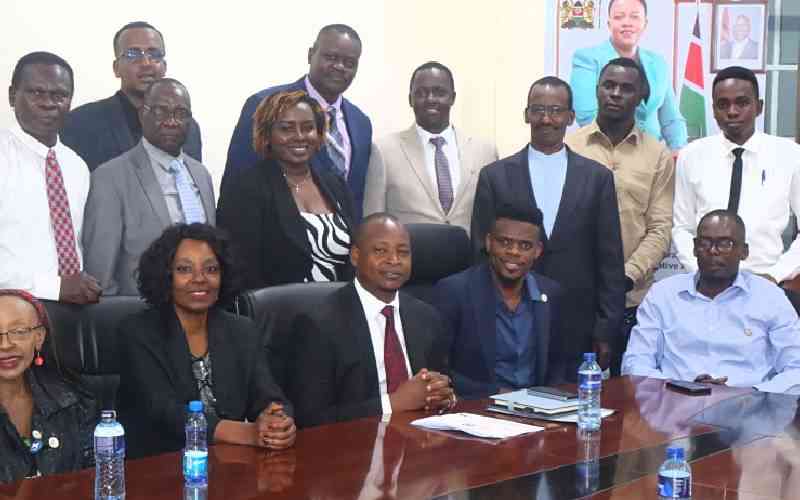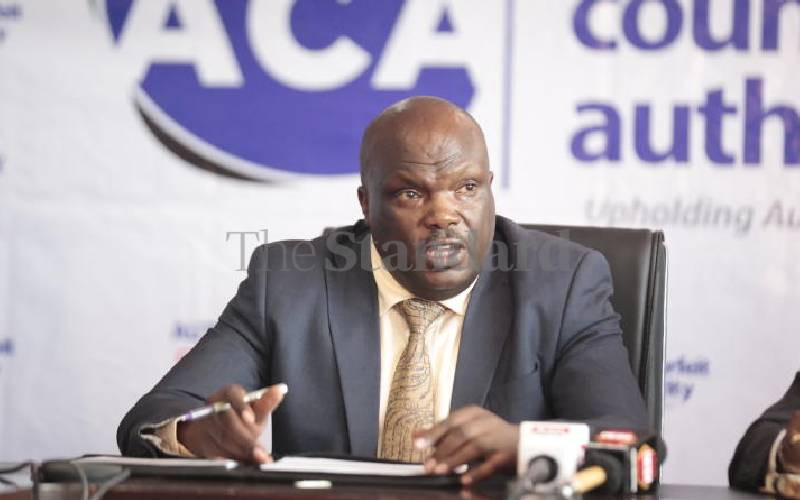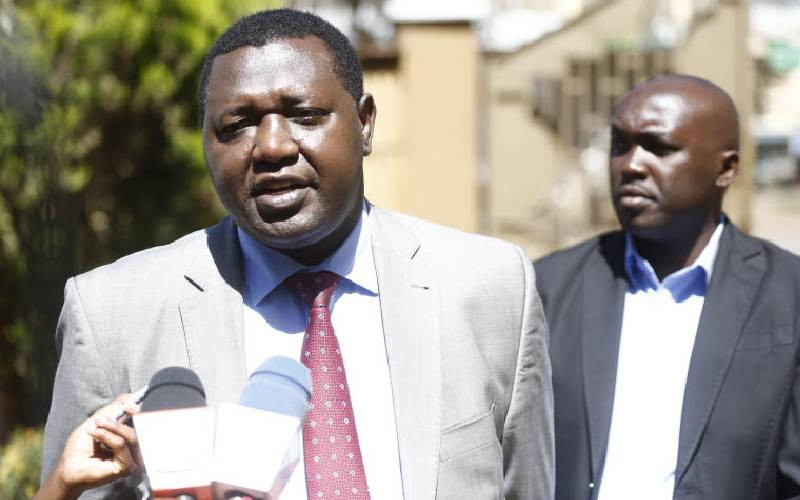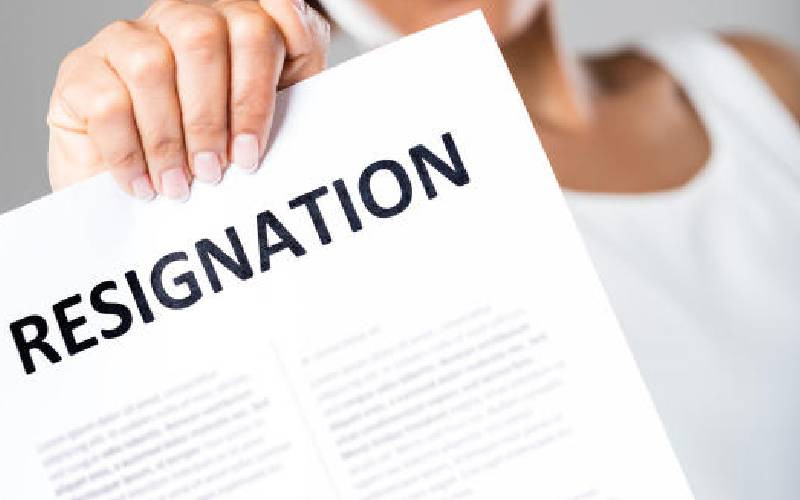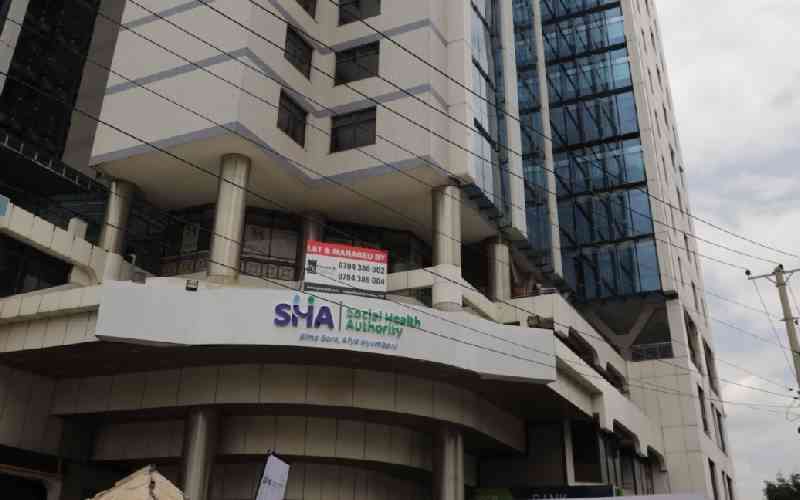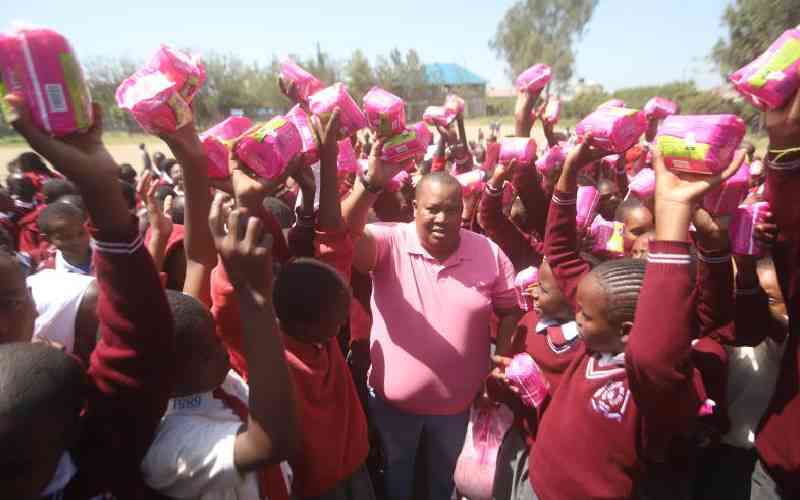
Businessman Maina Wakabura and Miruki Kariuki Primary School pupils, during celebrations to mark Menstrual Hygiene Day on May 28, 2024. Well-wishers donated pads to the girls. [File, Standard]
The World Bank estimates that over 500 million young women and girls globally struggle daily to manage their menstrual health and hygiene. Access to menstrual hygiene products, education, and safe facilities remains a persistent challenge for many, preventing their full participation in school, work, and their overall well-being. In 2024, period poverty continues to be a global health dilemma, a silent epidemic that is often overlooked. As a result, girls, young women, and others face numerous injustices and inequalities.The triple threat of stigma, unaffordable products, and inadequate sanitation fuels the global crisis of period poverty. This deep-seated shame surrounding menstruation is deeply ingrained in our culture, perpetuating harmful stereotypes and limiting access to essential resources. In Nepal, for example, some communities practice ‘Chhaupadi’. This illegal ancient tradition entails banishing people, often young girls, to mud huts or sheds for the duration of their period, to avoid bringing ‘bad luck’ to the family. Further, a 2023 Action Aid poll reported that one in five individuals who menstruate in the UK are struggling to afford period products. Such practices isolate girls, put their health at risk, and hinder their access to education and opportunities.
A 2022 study by the World Bank Group and Global Water Security and Sanitation Partnership in Kenya found that 65 per cent of girls and women struggle to afford sanitary pads due to the high cost, often leading to missed school days and health risks as they resort to unsafe alternatives. This affordability issue, coupled with the stigma surrounding menstruation, can have dire consequences on their reproductive rights. Consequently, a recent article in the media disclosed that girls in Turkana County and in remote villages in Kibish along the Kenya- Ethiopia border, use goat skin as substitutes for period products. This inevitably compromises their fundamental rights to human dignity and gender equality.
Additional reports from Amref Health Africa highlights that two out of three sanitary product users in rural Kenya are forced to have sex in exchange for sanitary products. The economic crisis has further worsened the situation, forcing many individuals to choose between essential necessities and purchasing period products.
The impact of period poverty extends far beyond the individual. It impacts entire communities, countries and regions hindering economic development, social progress and most importantly gains towards gender equality. We recognise that girls globally continue to face multifaceted challenges posed by period poverty. This further contributes to poverty and inequality, creating a vicious cycle that is often difficult to break. Immediate consequences such as missing school leads to long-term negative impacts including academic under-achievement, increased risk of dropping out which further exacerbates the cycle of poverty, perpetuating inequality. Beyond hindering their education, girls' physical and mental health is often compromised, contributing to low self-esteem, shame, and negatively impacting their overall well-being.
Kenya’s commitment to gender equality is enshrined in the Constitution which encompasses rich policy and legal frameworks. While Kenya has done well in fast-tracking a robust agenda towards a gender equal future for women and girls, the country still ranks poorly in gender parity with the latest 2024 Global Gender Parity report ranking Kenya at 75 out of 146 countries around the world. This signals the vulnerability of young women and adolescent girls who are still vulnerable to harmful gender stereotypes and cultural practices that continue to abet shame and stigma around menstrual health.
To date, many adolescent girls and young women are yet to experience a dignified menstrual health journey. Further statistics by Proctor and Gamble and Heart Foundation as reported by Buckner International indicate that 42 per cent of girls have never used sanitary pads and towels with most still using rags and cotton wool exposing them to infections and long-term health consequences. Also concerning, is the issue of accessibility, while Kenya was amongst the pioneer countries to abolish point of sale taxes on period products, we have seen tax measures continue to deal heavily on women proposing to tax raw materials used to manufacture period products. Simply put, these products are still luxurious goods to many adolescent girls and young women especially from informal settlements and rural communities.
However, as we commemorate International Day of the Girl Child next week, let’s remember fighting period poverty is not unconquerable. By breaking the silence and raising awareness, we can achieve a world where every girl can manage their period with dignity and live their best version of their life.
- Calls to end sexual violence against children dominate Girl Child's day
- Comic book on menstrual hygiene launched
- Urgent calls to end sexual violence dominate Girl Child's day
Keep Reading
Promoting accurate and accessible information about menstruation can help change negative period narratives and empower girls with knowledge about menstruation and its management. Fostering open community dialogues to dismantle period shame and stigma, will help to combat any myths and misconceptions about periods and avoid the dangers of spreading false information.
Governments, policymakers and policy influencers and the private sector should enforce the removal of taxation of menstrual products which impose an economic burden on sanitary product users. Ensuring free or subsidised high-quality sanitary products, along with improving infrastructure that is accessible and hygienic, with proper disposal facilities, in all schools and public places should be a priority.
Inevitably, more needs to be done to raise awareness about the importance of girls' menstrual health and the eradication of period poverty. Menstrual health should not be a painful journey. While many women and girls have diverse and intersectional experiences in their menstruation journey, it’s possible to create a dignified gender equal future that acknowledges menstrual health as a non-negotiable human right. Let us strive for this future where access to sanitation, a clean and safe environment is a global priority and a reality for all, especially girls, who deserve freedom from this silent epidemic.
 The Standard Group Plc is a multi-media organization with investments in media platforms spanning newspaper print
operations, television, radio broadcasting, digital and online services. The Standard Group is recognized as a
leading multi-media house in Kenya with a key influence in matters of national and international interest.
The Standard Group Plc is a multi-media organization with investments in media platforms spanning newspaper print
operations, television, radio broadcasting, digital and online services. The Standard Group is recognized as a
leading multi-media house in Kenya with a key influence in matters of national and international interest.

